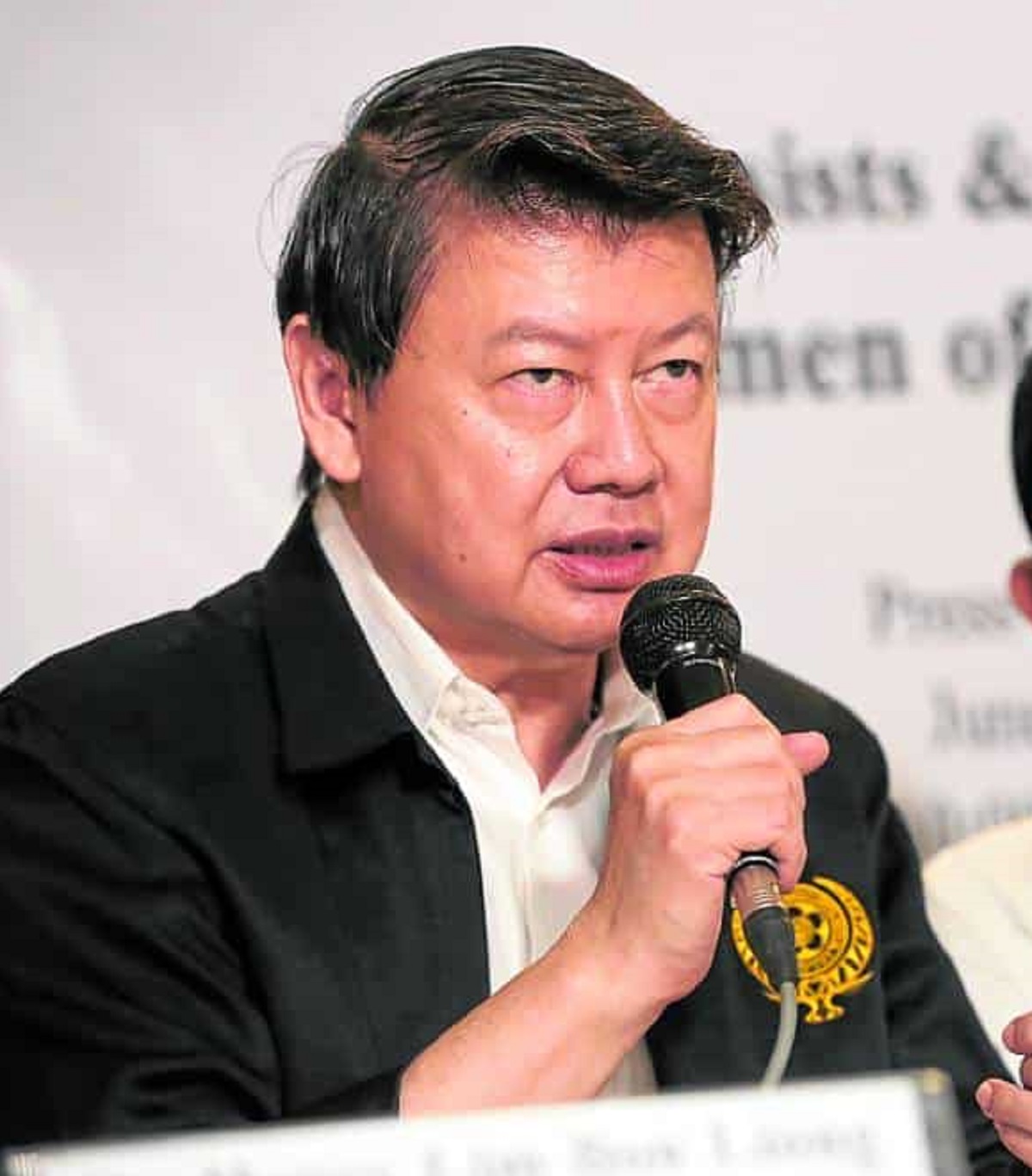
PHILANTHROPY Photo taken in June 2019 shows businessman Henry Lim Bon Liong speaking as president of the Federation of Filipino Chinese Chambers of Commerce and Industry Inc., as the group formally turns over some P1.2 million worth of livelihood assistance to 22 fishermen who survived a boat ramming incident in the West Philippine Sea. Lim died at the age of 72 on Aug. 2. —Niño Jesus Orbeta
MANILA, Philippines — Henry Lim Bon Liong, known as the Father of Philippine Hybrid Rice and one of the pillars of the Chinese-Filipino business community, died on Friday, about a month before his 73rd birthday.
The Sterling Paper Group of Companies confirmed the passing of its “esteemed leader.”
“Sir Henry or Sir HL, as we fondly called him, was a visionary whose lifework was dedicated to the growth and success of the companies under the Sterling Paper Group of Companies,” the company said in a statement on Saturday.
“He passed away peacefully, surrounded by loved ones,” said a statement from the Lim family, which did not specify the cause of death.
READ: The virtues that made Sterling Group a success story
“His visionary leadership and unwavering dedication have been the cornerstone of our organization’s growth,” it added. “As we mourn his loss, we also celebrate his extraordinary life and indelible impact he has made.”
The Sterling Group was founded by Lim’s father, Lim Seh Leng, in 1946 and had early success producing Sterling photo albums and stationery before venturing into the importation and manufacturing of school and office supplies.
READ: More funds, land for hybrid rice production in PH sought
His father unexpectedly died during a business trip abroad in 1976. Being the eldest, Lim took the Sterling reins at the age of 25, assisted by his mother and siblings.
Lim, an engineering graduate of the University of the Philippines Diliman, proved himself more than capable.
Passion project
Under his watch, the Sterling Group eventually expanded into a conglomerate with interests not just in school and office supplies but also in residential and commercial property development, business process outsourcing and agribusiness.
SL Agritech, a company he named in memory of his father, is considered to be his true passion project, driven by a vision to help the Philippines achieve rice self-sufficiency through hybrid rice production.
In a statement on Saturday, Cecilio Pedro, president of the Federation of Filipino Chinese Chambers of Commerce and Industry Inc. (FFCCCII), remembered Lim as “a dynamic advocate for Philippine agriculture.”
“His tireless efforts towards the dream of Philippine rice self-sufficiency through pioneering hybrid rice technology from China had left an indelible mark on our nation’s agriculture and have benefited millions of Filipino farmers,” Pedro said. “His commitment to this noble cause was driven by his unwavering belief in the potential of Filipino ingenuity and the importance of self-reliance.”
Lim was inspired to venture into hybrid rice production in the 1990s after seeing how China addressed food shortages and hunger through the successful development of hybrid rice seeds.
He wanted to replicate that success in the Philippines by setting up SL Agritech Corp., where he was the chair and CEO at the time of his passing.
SL Agritech embarked on its own research, a pursuit that led Lim to go to China and personally meet Chinese agricultural scientist and educator Yuan Long Ping, known as the “father of hybrid rice.”
They soon forged a partnership that would propel the success of SL Agritech as a pioneer in research, development and production of tropical hybrid rice seeds in the Philippines.
To date, the company has more than 3,000 people in its research, production and administrative facilities in Makati City, the provinces of Laguna, Nueva Ecija, Bulacan, and the Davao region.
Its premium rice under the Doña Maria brand is now exported to North America, Canada, United Arab Emirates, Saudi Arabia, Kuwait, Qatar, Jordan, Bahrain, Israel, Pakistan, Australia, Singapore, Guam and Marshall Islands.
PH-China friendship
Continually improving its research and development capabilities, the company has produced several hybrid rice seed varieties known for high yields even in a tropical climate. Before these breakthroughs, hybrid rice was only known to be more suited for temperate conditions.
FFCCCII also paid tribute to Lim, its honorary president, as a fervent advocate of Philippine-China friendship and economic cooperation, a relationship increasingly being tested by the West Philippine Sea maritime dispute.
FFCCCII also underscored Lim’s role as chair of the Filipino-Chinese Community Calamity Fund, a major aid contributor in disaster relief efforts and during the coronavirus pandemic.
“Dr. Henry Lim Bon Liong’s visionary leadership was evident when he acted as an intermediary for the Philippine government to receive the first-ever timely delivery and donation of 1 million lifesaving anti-COVID vaccines from the government of China,” Pedro recalled.
He not only helped save Filipino lives but also demonstrated “his profound dedication to the well-being of our nation,” Pedro added. “He was a source of hope and of inspiration to many, and his legacy will continue to influence and guide us. May his legacy continue to inspire future generations.”
Lim is survived by his wife, Rita Ong Lim; and children Michelle Gankee, Cherie Lin, Brian Lim, Hazel Leehok and Pauline Qua.
The wake and memorial service is at the Sanctuarium on Araneta Avenue, Quezon City.
Cremation will be on Aug. 12 at 10 a.m.